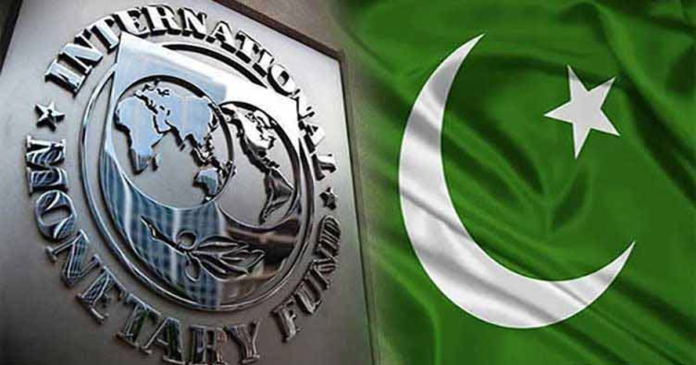Pakistan and the International Monetary Fund (IMF) have agreed to a staff-level stand-by arrangement worth $3 billion, the lender announced. The South Asian country, which is on the verge of default, has long awaited this decision.
Pakistan and IMF reach staff-level agreement: The agreement comes after an eight-month delay and provides some relief to Pakistan, which is suffering a severe balance of payments problem and declining foreign exchange reserves. It is subject to confirmation by the IMF board in July.
The $3 billion in payment, spread out over nine months, is more than Pakistan was anticipating. The remaining $2.5 billion from a $6.5 billion bailout package agreed upon in 2019 that expired on Friday was still pending disbursement to the nation.
In a statement on Thursday, IMF representative Nathan Porter stated that the new stand-by agreement builds on the 2019 plan. He further highlighted that Pakistan’s economy had recently faced several challenges, including disastrous floods last year and rising commodity prices due to the conflict in Ukraine.
“Economic growth has stagnated as a result of these shocks as well as some policy errors, such shortages from restrictions on the operation of the FX market. “Inflation is very high, even for necessities,” he continued.
“Reserves have fallen to extremely low levels in spite of the government’s efforts to lower imports and the trade deficit. The power sector continues to experience severe liquidity issues, according to Porter’s statement.
Given these difficulties, he added, the new agreement would serve as a framework for future financial assistance from multilateral and bilateral partners.
IMF and Pakistani Authorities Reach Agreement on Stand-By Arrangement to Stabilize Economy and Support Development Spending
In contrast, the news statement from the IMF highlights that the IMF staff and the Pakistani authorities have reached a staff-level agreement on policies that the Stand-By Arrangement (SBA) will support.
The new SBA will “support the authorities’ immediate efforts to stabilise the economy from recent external shocks, preserve macroeconomic stability, and provide a framework for financing from multilateral and bilateral partners,” the statement continued.
Through enhanced domestic revenue mobilisation and cautious spending execution to help meet the requirements of the Pakistani people, the new SBA will also make room for social and development spending, according to the IMF.
“Steady policy implementation is key for Pakistan to overcome its current challenges,” the statement continued. “This includes greater fiscal discipline, a market-determined exchange rate to absorb external pressures, and further progress on reforms, particularly in the energy sector, to promote climate resilience and to help improve the business climate.”
The parliament passed the FY24 budget, according to the IMF, “in line with the goals of supporting fiscal sustainability and mobilising revenue, which will enable greater social and development spending.”
The budget “advance[s] primary surplus of roughly 0.4% of GDP by taking some efforts to extend the tax base and enhance tax collection from undertaxed sectors, as well as enhancing progressivity, while ensuring space to strengthen support for vulnerable through BISP,” it was further said.
In the coming time, it will be crucial for the authorities to carry out the budget as intended and resist calls for unplanned spending or tax breaks.
SBP Commits to Market-Determined Exchange Rate as IMF Highlights Importance of Inflation Control and Foreign Exchange Flexibility
The article continued by stating that the State Bank of Pakistan (SBP) had reportedly withdrawn the guidance on import prioritization and expressed its commitment to ensuring the full market determination of the exchange rate.
The IMF emphasised that moving forward, the SBP should continue to be proactive in tackling inflation, which disproportionately impacts the most disadvantaged, and maintain a foreign exchange environment devoid of constraints on payments and transfers for ongoing international transactions and multiple currency practises.
The press announcement said, “The authorities’ efforts have centred on acquiring additional financing and securing the rollover of debt due. Generous climate-related promises from the January 2023 Conference on Climate Resilient Pakistan held in Geneva.
It claimed that doing so would “support near-term policy efforts and replenish gross reserves, with a view to bringing them to more comfortable levels.”
The IMF stated that the “authorities’ programme also includes ongoing efforts to strengthen the viability of the energy sector (including through a timely FY24 annual rebasing), improving SOE (state-owned enterprise) governance, and strengthening the public investment management framework, including for projects needed to build resilience to climate change”
The international lender stressed that “the program’s success will be critical for its timely and full implementation in light of the difficult challenges.”
Ishaq Dar, the finance minister, shared the IMF news release after the deal was finalised and thanked God.
The development was described as “good news” by Ahsan Iqbal, the minister of planning.
In a tweet, he wrote, “Let’s resolve to implement Turn Around Pakistan’s 5E framework to make our economy strong & sustainable by developing it to its full potential.”
Michael Kugelman, the Director of the Wilson Centre’s South Asia Institute, stated that Pakistan had waited until the very last hour to take the politically risky fiscal policy steps. He further suggested that taking those steps earlier would have likely avoided much of the drama and fraught negotiations of recent months.
He added, “In all likelihood, when PM Sharif met the IMF director in Paris last week, she delivered a ‘now or never’ warning to him.”
A staff-level agreement for a vital bailout deal with the IMF was “very close” and expected in the next 24 hours, according to Finance Minister Ishaq Dar’s statement from last night.
$4 billion has already been made available. Dar previously told the media that the government was developing a procedure to try to release the entire $2.5 billion still held in escrow under the IMF programme.

